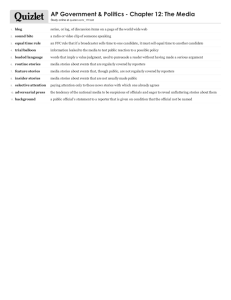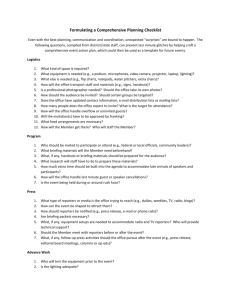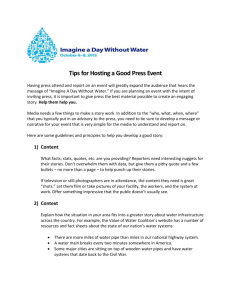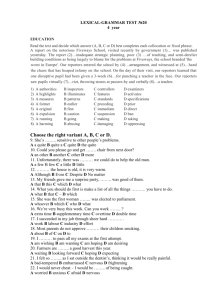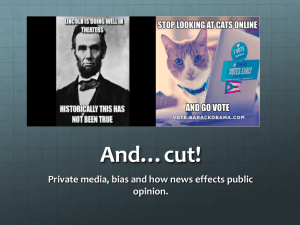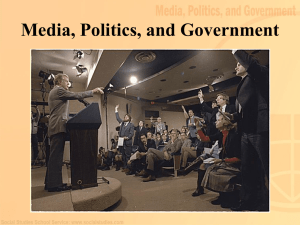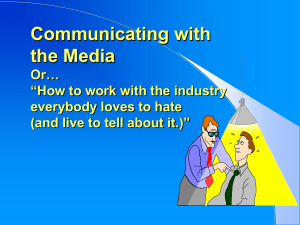Bad-Journalism
advertisement
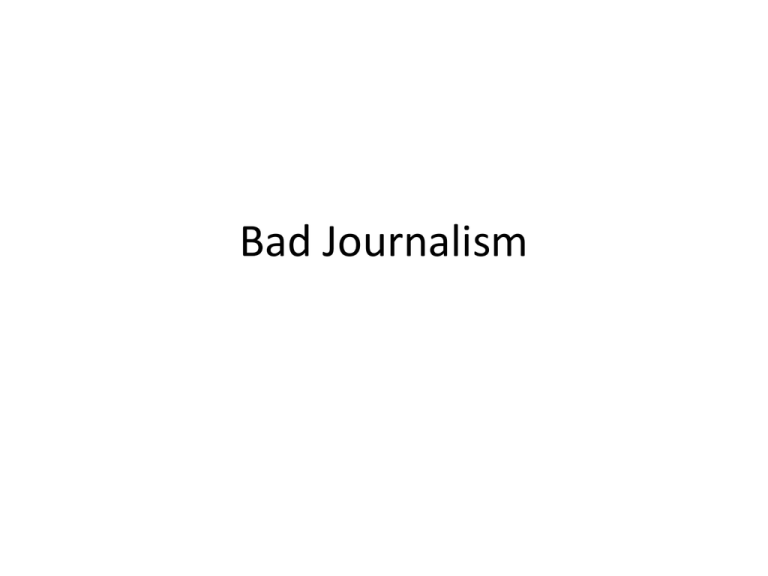
Bad Journalism The Fourth Estate The press is often called “the fourth estate”– a political power different from the three branches of government (executive, legislative, and judiciary) that keeps them in check. A healthy press is an adversarial press. The Necessary Press In addition, media– once newspapers, but now mostly televised news and internet news– is the principle source of information people have about world events, scientific developments, health, and politics. Even if you get your news from friends on facebook– someone has to get it from the news media. Afflicting the Comfortable The press is supposed to “comfort the afflicted and afflict the comfortable.” Unfortunately, the news can be horribly misleading, full of discredited falsehoods and propaganda. It can comfort the comfortable and afflict the afflicted. FOOLING MICHAEL cf18 comments “…it looks like 78.1% of people in Hong Kong dislike other races… But don’t you find it more unbelievable that the next two questions say 80% people don’t mind having drunks or emotionally unstable peoples as neighbours Or even more crazy stuff on the next page, which say 90% people think it’s fine to have drug addicts as neighbours … The correct result should be: In Hong Kong 78.1% found it acceptable to have different race neighbours, while less than 20% found it acceptable to have drunks, emotionally unstable and drug addicts as neighbours.” NEWS ORGANIZATION Newspaper Organization A newspaper contains: • News reports • Editorials • Advertisements Reporters Reporters generate news stories. Some of them cover “beats” (local politics, sports team, etc.) and some of them receive different assignments at different times. Reporters There are good reporters. But there aren’t many of them. Since the age of the internet, the numbers of reporters has not changed, but the amount they have to write has increased by three times. Public Relations Public relations (often just called PR) consists of all the activities that individuals, companies, and organizations take to control and influence the spread of information about them. PR activities include: • Marketing • Issuing press releases • Giving interviews • Writing/ videotaping news stories! Churnalism “19% of newspaper stories and 17% of broadcast stories were verifiably derived mainly or wholly from PR material, while less than half the stories we looked at appeared to be entirely independent of traceable PR.” – Lewis et. Al (on the course website) Churnalism 47% of the British stories are from “the wire” (news services like AP), and not written by the reporters at the papers. Many of the wire stories also have their origin in PR material. Churnalism Here’s a story from the Irish Independent (Ireland’s biggest newspaper): Wave goodbye to global warming, GM and pesticides Radio wave-treated water could change agriculture as we know it. Groundbreaking Technology “A GROUNDBREAKING new Irish technology which could be the greatest breakthrough in agriculture since the plough is set to change the face of modern farming forever.” Magic Water! “The technology – radio wave energised water – massively increases the output of vegetables and fruits by up to 30 per cent. Not only are the plants much bigger but they are largely disease-resistant, meaning huge savings in expensive fertilisers and harmful pesticides.” $$$ Vi Aqua $$$ “The compact biscuit-tinsized technology, which is called Vi-Aqua – meaning ‘life water’ – converts 24 volts of electricity into a radio signal, which charges up the water via an antennae.” The Stupidest Thing Ever “Vi-Aqua makes water wetter” – Professor Austin Darragh, Limerick University Video News Release It gets worse on television. In print media, PR companies write articles, but at least real reporters (sometimes) change them to be more honest. On TV, PR companies film advertisements pretending to be news, and that’s all you see! http://www.youtube.com/watch?v=09 NTUwp1s6U • All references to Walmart in the 3rd person: “The world’s largest food retailer says…” “Walmart says…” • Never: “We say…” “According to us…” • All interviews with Walmart staff and promoters, no discussion of any other companies. • “Reporting from Walmart, I’m Phil Keene” – no indication he works for Walmart! http://www.youtube.com/watch?v=xB ze5atYyCo • The government does it too! • None of the interviewees is named, their organizations aren’t mentioned. • Only one side of the law is presented, no one says anything bad. • “In Washington, I’m Karen Ryan, reporting.” Clickbait But not all reporting is written by companies to sell you products, or government trying to gain your support. Some of it is simply written by reporters to sell you newspapers (or to get you to click on the story, so you get served their ads). Aliens! Here’s something from the Telegraph, the third most visited newspaper site in Britain: Alien life found living in Earth's atmosphere, claims scientist Aliens do exist and have been found living in the clouds above the Peak District, according to new claims by scientists. Aliens! With a Nose and Anus! Unsurprisingly… The “scientific” research supporting this finding was published in The Journal of Cosmology. The JoC is a predatory open access journal that publishes bad research in exchange for author fees. It is known for publishing fringe viewpoints and bad science. Sadly… Most science journalists don’t know anything about science (they have journalism degrees), and cannot tell an odds ratio from a risk ratio or a real scientific journal from a joke. You are better critical thinkers than the people who write the news! Scaremongering Another common tactic to get page views is called scaremongering or fear mongering: telling people that X is going to kill them, so watch the news to find out what X is and how to stop it. Vaccine Scare The false claim that vaccines cause autism got started in the scientific research: a fraudulent paper by a researcher who was later stripped of his ability to practice medicine. But the news media played a large role in the scare story, and the papers that pushed the story never made an equally big deal about how they were wrong. UK Has 20% of US population NPR reports: “More than 1,200 people have come down with measles [in UK] so far this year [in May], following nearly 2,000 cases in 2012.” Compare: “Each year there are about 60 cases of in the United States, according to the Center for Disease Control and Prevention… These new cases are caused by international travelers who bring the virus with them to the U.S.” “Third Party Advocate” When there’s a debate, there are two interested parties to the debate. In the debate over whether cigarette advertising is targeting children, there are the concerned parents who think their children are being targeted, and the cigarette companies who think their advertising is age-appropriate. “Third Party Advocate” A “third party advocate” is someone who is in theory uninterested. They aren’t harmed if the debate turns out one way and they aren’t harmed if it turns out another way. Their views and arguments are “objective.” Of course, powerful interests like the tobacco lobby try to install fake “third party advocates” to promote their views. Malcolm Gladwell Malcolm Gladwell is an author of four books that reached the New York Times bestselling books list. He has had a column at The New Yorker since 1996. Malcolm Gladwell He is also a paid advocate for Philip Morris, the world’s largest cigarette company. In his book The Tipping Point, Gladwell blamed children for getting themselves addicted to tobacco and absolved tobacco industry advertising campaigns of guilt. Malcolm Gladwell Confidential Philip Morris documents bragged, “Marlboro’s phenomenal growth rate in the past has been attributable in large part to our high market penetration among young smokers . . . 15 to 19 years old.” Self-Censorship Another way reporters get the news wrong is that they don’t report it. Sometimes news angers those in authority, and journalists bow to their wishes. Li Wangyang In June of 2012, Li Wangyang was discovered hanging from his hospital room, after two decades of imprisonment for the Tiannenmen Square protests. Protests Many factors indicated that Li had been murdered. 180,000 Hong Kongers protested the death. Protests Wang Xiangwei, a mainlander and a Chinese People’s Political Consultative Congress member, is the editor in chief of the South China Morning Post. He reduced reports about the suspicious death of Li Wangyang to a short blurb. Protests 30 SCMP reporters signed a letter protesting the decision. “87% of reporters, photographers, editors, and management surveyed said that media freedoms had deteriorated in the past several years” (HongWrong) Government Propaganda Surveillance states are governments like China, the US, and Britain, that spend large amounts of resources spying on their own citizens. These states often try very hard to prosecute “whistleblowers” who “leak” information about their crimes and spying to the public. Government Propaganda Surprisingly, these same governments constantly leak top secret information to the press. These leaks are purposeful, and they are never investigated, and never prosecuted. The same government that wants to put Snowden in prison for life because he leaked secrets has recently leaked the secret that “Britain runs a secret internet-monitoring station in the Middle East to intercept and process vast quantities of emails, telephone calls and web traffic on behalf of Western intelligence agencies.” Government Propaganda Why? They wanted to prove that Snowden leaked info that helped the terrorists. So they leaked info that helped the terrorists and claimed Snowden did it. Did the reporters at the Independent reveal this? No. Because they are on the government’s side. Government Propaganda Governments leak information all the time “confidentially” so they can start rumors, or accuse enemies without having to stand by their assertions. And journalists publish these anonymous rumors and accusations with no evidence or investigation that they’re true. Editorials In addition to news reporting, newspapers also run editorials (television has the same thing, where “talking heads” come on TV and spout their views). Editorials don’t need to be by experts (neither does reporting), don’t need to have any facts or evidence, and are often nothing but lies and propaganda. Fact Checking Substantive, objective statements of fact are (ideally) fact-checked. This means that if a reporter writes a factual statement, someone else at the paper makes sure it’s true. (For example, if it’s a quote, they call the person quoted.) Subjective statements like “Harry Potter books are boring” don’t need fact checking. George Will “According to the University of Illinois’ Arctic Climate Research Center, global sea ice levels now equal those of 1979.” In The Washington Post, one of America’s most important newspapers, in 2009. Scientists Respond “We do not know where George Will is getting his information, but our data shows that on February 15, 1979, global sea ice area was 16.79 million sq. km and on February 15, 2009, global sea ice area was 15.45 million sq. km. Therefore, global sea ice levels are 1.34 million sq. km less in February 2009 than in February 1979. This decrease in sea ice area is roughly equal to the area of Texas, California, and Oklahoma combined.” – Illinois climate scientists. Fact Checking “the Post has a multi-layer editing process and checks facts to the fullest extent possible. In this instance, George Will’s column was checked by people he personally employs, as well as two editors at the Washington Post Writers Group, which syndicates Will; our op-ed page editor; and two copy editors.” – Ombudsman for the Washington Post Infotainment Some news outlets have gotten so tired of responding to claims that they present false things as true, that they’ve declared their “news” is really “infotainment” – entertainment centered around the news, not necessarily meant to portray facts. They Still Call It News From billoreilly.com: “Now in its tenth year on the air, ‘The O'Reilly Factor’ on the Fox News Channel remains the dominant number one news program in the USA.” From FOXNews.com: “In 2000, The Factor...passed Larry King Live to become the number one cable news program in the United States.” “Advertorials” Advertorials An “advertorial” is an advertisement that pretends to be an editorial. These are somewhat common, but easy to spot. Native Advertising The new version of advertorials – often on social media websites like facebook and digg – is called “native advertising.” It’s advertising designed to look like content that appears naturally (“natively”) on these social websites.
